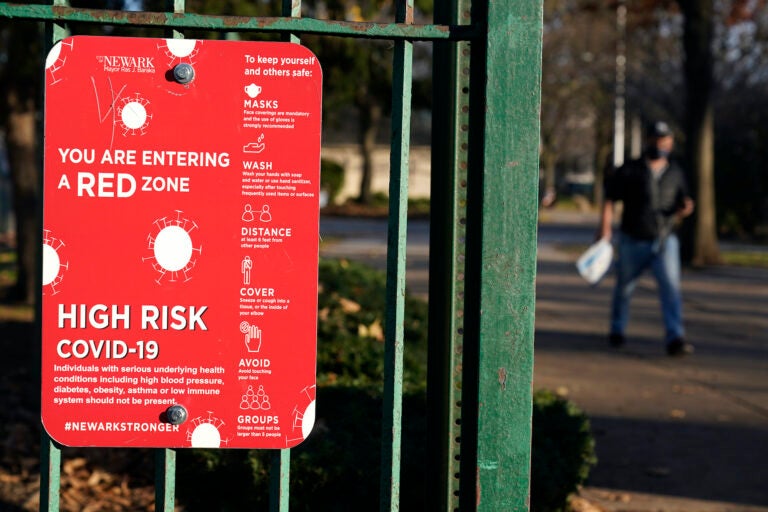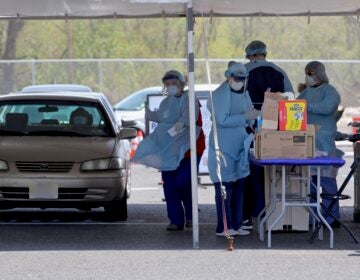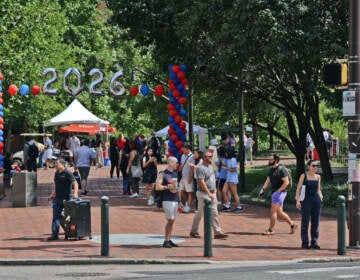N.J. coronavirus update: Murphy says scenario will improve if people take precautions
In sharing modeling used to follow the virus, the governor said a moderate-case scenario can be achieved by mask-wearing, distancing, 'using common sense.'

A sign at the entrance to a park warns pedestrians about increased risk for the coronavirus in the Ironbound section of Newark, N.J., Tuesday, Nov. 24, 2020. (AP Photo/Seth Wenig)
Ask us about COVID-19: What questions do you have about the current surge?
Updated: 5:42 p.m.
New Jersey officials reported on Wednesday an additional 4,665 confirmed COVID-19 cases, raising the cumulative total to 381,486 since the first case was reported on March 4. An additional 91 deaths were also reported, bringing the toll from the virus to 15,674 since the first death from it was reported March 10.
The state hospital association reported 3,533 hospitalizations as of Tuesday night; 630 patients are in intensive care, and 412 are on ventilators.
Gov. Phil Murphy gave the numbers before sharing how officials try to predict what will happen next in the pandemic. The numbers were used as a way to provide context into how two models – one developed by the state Health Department and the other by the Office of Innovation – help them navigate the best next steps.
Murphy shared two scenarios; a worst-case scenario, assuming that the status quo of “pandemic fatigue” remains, and a moderate-case scenario, dependent on whether people keep up with wearing face masks and physical distancing.
Under the moderate-case scenario, the models predict at least 2,000 fewer COVID-19 cases at the peak of the current case surge compared to the worst-case scenario.
The governor said that the models changed every day, and that reaching the moderate scenario depends on residents continuing to take precautions.
“They improve the more we focus on social distancing, the more we wear our masks; the more we use common sense,” Murphy said.
He added that under a moderate-case scenario, he would not need to implement the more stringent coronavirus restrictions that were seen in the spring.
Dr. Paschal Nwako, Camden County health officer and public health coordinator, concurred that keeping up with the precautions against COVID-19 can change the impact of the models the governor discussed.
“What we are telling the public is continue wearing their masks,” he said, adding, “It’s not politics; it’s pure science.
“We don’t have the vaccine now, so the face masks cover for the vaccine,” Nwako said.
N.J. communities of color hit harder, less likely to trust vaccination
The coronavirus pandemic has caused widespread economic losses. But a new survey from the Newark-based social justice nonprofit Project Ready said the finances of Black and Latino residents in the Garden State were more deeply impacted.
The survey says 61% of those polled have had a lot or some financial impact. When broken down by race, 73% of African Americans and 70% of Latinos felt some form of financial hurt compared to 57% of whites.
“Our poll shows that Black voters are almost twice as likely as white voters to say that they or someone in their household has lost a job,” said Shennell McCloud, executive director of Project Ready. She adds that the survey showed that Black voters are three times as likely as white voters to say they’ve been unable to pay the rent or their mortgage during the pandemic.
Despite the disproportionate impacts of the pandemic on communities of color financially, McCloud said the survey shows they are also the least likely to agree to be vaccinated from the coronavirus.
“What I attribute that to overall is a long history of mistreatment of communities of color by the medical community even to this day,” she added. “People still see that inequities continue to exist within our healthcare system.”
Mercer County residents who came to a pop-up COVID-19 testing site Tuesday at the Cure Insurance Arena in Trenton expressed mixed feelings about taking a vaccine when one becomes available.
The Project Ready survey was conducted by Change Research, which spoke with 958 New Jersey voters from across the state.

Get daily updates from WHYY News!
WHYY is your source for fact-based, in-depth journalism and information. As a nonprofit organization, we rely on financial support from readers like you. Please give today.




![CoronavirusPandemic_1024x512[1]](https://whyy.org/wp-content/uploads/2020/03/CoronavirusPandemic_1024x5121-300x150.jpg)


